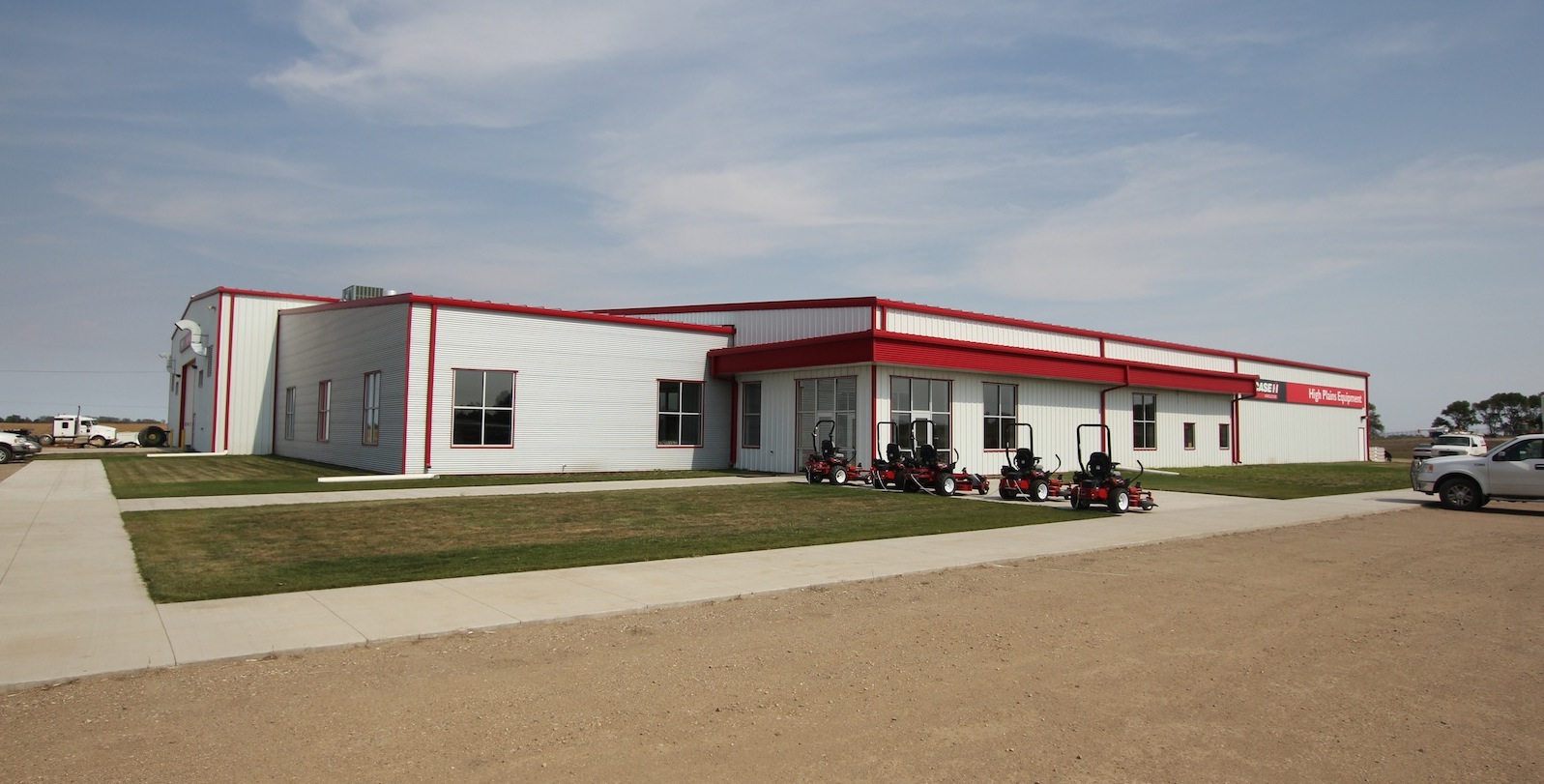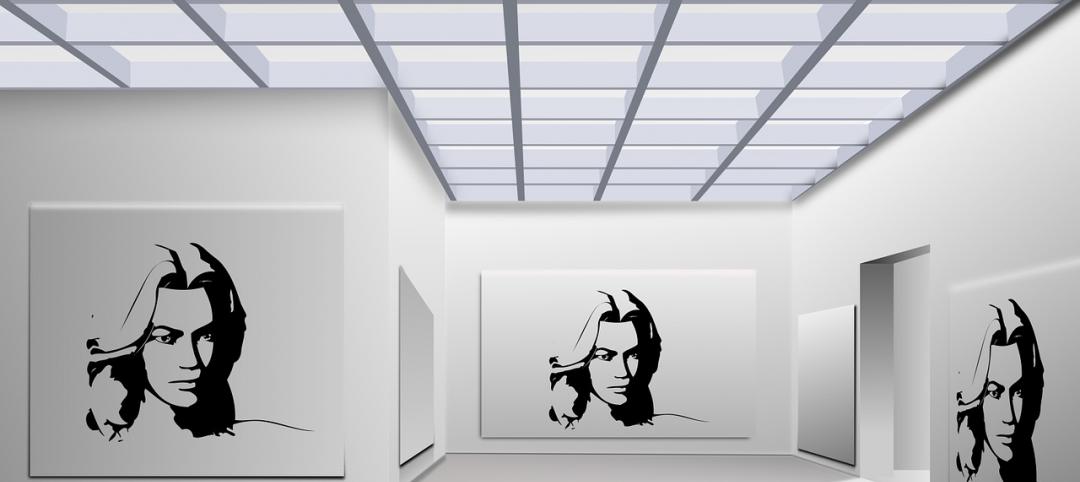As modern agricultural equipment continues to get larger and more sophisticated, the buildings that sell and service those massive earthmovers must do the same.
That’s why High Plains Equipment, an independent Case IH dealership in Devils Lake, N.D., decided to replace its existing cramped quarters with a spacious, state-of-the-art metal building.
“We needed to do this for our customers. It’s as simple as that,” says John Swenseth, the company’s owner/operator.
The new space—a 38,117-sf facility with a 7,950-sf second-level mezzanine—is three times the size of the former building, improving the dealership’s ability to serve its growing customer base.
Situated on a 22-acre site along U.S. Highway 2, the new building replaces the dealership’s existing 12,000-sf building located on a much less visible site.
“Now we get people stopping in here who didn’t even realize there was a Case IH dealer in town,” Swenseth says.
The project’s three buildings include a symmetrically gabled structure and two lean-to buildings, each braced by the gabled structure.
The facility’s large clear span enabled the installation of a dozen 25-foot service bays, twice as many and twice as large as in the previous facility.
The main structure also houses two 5-ton bridge cranes, each extending 175 feet and spanning 35 feet.
“The overhead cranes are making life easier and less strenuous for our technicians,” Swenseth says. “With more shop space, we’re able to hire more technicians and they can work inside instead of outside in the mud.”
Because technicians now have the space to work on more than one job at a time, productivity has been boosted. And the facility’s three overhead doors and dedicated wash bay contribute to improved operational efficiency.
“This is a very nice technical shop,” says Mike Dunn, business development manager of Construction Engineers Ltd., the Star builder in Grand Fork, N.D. “It includes floor heat and an air-conditioning system to keep the technicians comfortable year-round.”
The new facility also includes an expanded merchandise and display area as well as an indoor expo room and kitchen for hosting customer training clinics and community events.
“It’s a good experience for customers when they come in,” Swenseth says. “It’s big and open and clean and modern. They appreciate that.”
A fast-track, design-build construction schedule enabled the building team to complete the project in about eight months.
“We assembled a lot of the frames and the roof structure on the ground, and brought a crane onsite to lift larger portions of it into place to save time and increase safety on the project,” Dunn says. “We were able to take advantage of the short building season and meet the owner’s timeline to complete the building in time for the spring selling and service season.”
Related Stories
Museums | Aug 11, 2010
Design guidelines for museums, archives, and art storage facilities
This column diagnoses the three most common moisture challenges with museums, archives, and art storage facilities and provides design guidance on how to avoid them.
| Aug 11, 2010
Broadway-style theater headed to Kentucky
One of Kentucky's largest performing arts venues should open in 2011—that's when construction is expected to wrap up on Eastern Kentucky University's Business & Technology Center for Performing Arts. The 93,000-sf Broadway-caliber theater will seat 2,000 audience members and have a 60×24-foot stage proscenium and a fly loft.
| Aug 11, 2010
Citizenship building in Texas targets LEED Silver
The Department of Homeland Security's new U.S. Citizenship and Immigration Services facility in Irving, Texas, was designed by 4240 Architecture and developed by JDL Castle Corporation. The focal point of the two-story, 56,000-sf building is the double-height, glass-walled Ceremony Room where new citizens take the oath.
| Aug 11, 2010
Carpenters' union helping build its own headquarters
The New England Regional Council of Carpenters headquarters in Dorchester, Mass., is taking shape within a 1940s industrial building. The Building Team of ADD Inc., RDK Engineers, Suffolk Construction, and the carpenters' Joint Apprenticeship Training Committee, is giving the old facility a modern makeover by converting the existing two-story structure into a three-story, 75,000-sf, LEED-certif...
| Aug 11, 2010
Utah research facility reflects Native American architecture
A $130 million research facility is being built at University of Utah's Salt Lake City campus. The James L. Sorenson Molecular Biotechnology Building—a USTAR Innovation Center—is being designed by the Atlanta office of Lord Aeck & Sargent, in association with Salt-Lake City-based Architectural Nexus.
| Aug 11, 2010
San Bernardino health center doubles in size
Temecula, Calif.-based EDGE was awarded the contract for California State University San Bernardino's health center renovation and expansion. The two-phase, $4 million project was designed by RSK Associates, San Francisco, and includes an 11,000-sf, tilt-up concrete expansion—which doubles the size of the facility—and site and infrastructure work.
| Aug 11, 2010
Goettsch Partners wins design competition for Soochow Securities HQ in China
Chicago-based Goettsch Partners has been selected to design the Soochow Securities Headquarters, the new office and stock exchange building for Soochow Securities Co. Ltd. The 21-story, 441,300-sf project includes 344,400 sf of office space, an 86,100-sf stock exchange, classrooms, and underground parking.
| Aug 11, 2010
New hospital expands Idaho healthcare options
Ascension Group Architects, Arlington, Texas, is designing a $150 million replacement hospital for Portneuf Medical Center in Pocatello, Idaho. An existing facility will be renovated as part of the project. The new six-story, 320-000-sf complex will house 187 beds, along with an intensive care unit, a cardiovascular care unit, pediatrics, psychiatry, surgical suites, rehabilitation clinic, and ...
| Aug 11, 2010
Colonnade fixes setback problem in Brooklyn condo project
The New York firm Scarano Architects was brought in by the developers of Olive Park condominiums in the Williamsburg section of Brooklyn to bring the facility up to code after frame out was completed. The architects designed colonnades along the building's perimeter to create the 15-foot setback required by the New York City Planning Commission.








